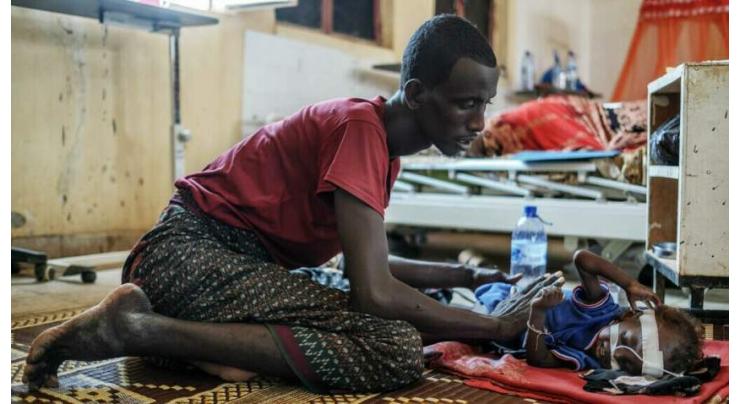
Worst Drought In Decades Devastates Ethiopia's Nomads
Faizan Hashmi Published May 11, 2022 | 12:36 PM

There has hardly been a drop of rain in Hargududo in 18 months. Dried-up carcasses of goats, cows and donkeys litter the ground near the modest thatched huts in this small village in the Somali region of southeastern Ethiopia
Gode, Ethiopia, (APP - UrduPoint / Pakistan Point News - 11th May, 2022 ) :There has hardly been a drop of rain in Hargududo in 18 months. Dried-up carcasses of goats, cows and donkeys litter the ground near the modest thatched huts in this small village in the Somali region of southeastern Ethiopia.
The worst drought to hit the Horn of Africa in decades is pushing 20 million people towards starvation, according to the UN, destroying an age-old way of life and leaving many children suffering from severe malnutrition as it rips families apart.
April is meant to be one of the wettest months of the year in this region. But the air in Hargududo is hot and dry and the earth dusty and barren.
Many of the animals belonging to the 200 semi-nomadic herder families in the village have perished.
Those who had "300 goats before the drought have only 50 to 60 left. For some people... none have survived," 52-year-old villager Hussein Habil told AFP.
The tragic story is playing out across whole swathes of southern Ethiopia and in neighbouring Kenya and Somalia.
In Ethiopia, the eyes of the world have largely focused on the humanitarian crisis in the north caused by the war between government forces and the Tigray People's Liberation Front (TPLF) that has left nine million people in need of emergency food aid.
But the UN Office for the Coordination of Humanitarian Affairs (OCHA) estimates that up to 6.5 million people in Ethiopia -- more than six percent of the population -- are also severely food insecure because of drought.
Lack of rain has killed nearly 1.5 million head of livestock, around two-thirds of them in the Somali region, said OCHA, showing "how alarming the situation has become".
Herds provide the nomadic or semi-nomadic populations of this arid and hostile region with food and income as well as their savings.
But the surviving animals have deteriorated so much that their value has plummeted, reducing the buying power of the increasingly vulnerable households, OCHA warned.
Related Topics
Recent Stories

Punjab CM inaugurates Pakistan’s first Virtual Women Police Station

Dutch model Donny Roelvink embraces Islam

Experts raise concerns over introduction of 10-stick packs

Iranian president arrives in Karachi

Law Minister expresses Govt's resolve to address issue of missing persons

Rizwan’s batting order may be changed: Sources

Nawaz Sharif to visit Guangzhou exhibition in China

FM Dar not traveling to China: Foreign Office

PM takes notice of deliberate delay in tax cases

Iranian President visits Allama Iqbal’s mausoleum

Iranian President arrives in Lahore today

Currency Rate In Pakistan - Dollar, Euro, Pound, Riyal Rates On 23 April 2024
More Stories From World
-
Football: Italian Cup result
29 minutes ago -
Football: English Premier League result
29 minutes ago -
Talks on global plastic treaty begin in Canada
29 minutes ago -
US markets rise for second straight day as sentiment improves
29 minutes ago -
Asia hit hardest by climate change, extreme weather: UN weather agency
39 minutes ago -
Migrant boat capsizes off Djibouti leaving 21 dead
7 hours ago
-
Tesla profits tumble 55% as EV sales under pressure
7 hours ago -
Talks on global plastic treaty begin in Canada
7 hours ago -
Migrant deportations loom after parliament passes UK-Rwanda plan
8 hours ago -
Macron in last-ditch bid to halt EU vote battering
8 hours ago -
Ukraine moves to bring military-aged men home to fight
9 hours ago -
Asia hit hardest by climate change, extreme weather: UN weather agency
9 hours ago